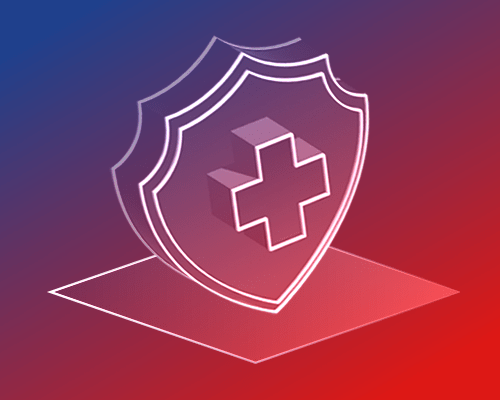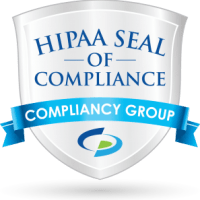
Ensure Patient Data Privacy with HIPAA Compliance
Hospitals, clinics, dental offices, nursing homes, and other health-related facilities are required by law to be HIPAA (The Health Insurance Portability and Accountability Act) compliant.
However, navigating the HIPAA compliance process can be a time-intensive endeavor, often inundated with paperwork and complexities that may overwhelm your team. At Empowered IT Solutions, we recognize these challenges and offer a comprehensive consulting program tailored to streamline your compliance journey. Additionally, our specialized training program equips your staff with the knowledge and tools necessary to fortify internal security procedures, ensuring robust protection of sensitive data.
HIPAA Compliance Consulting
Empowered IT Solutions is HIPAA certified, so we understand the challenges and complexities that come with achieving and maintaining HIPAA compliance for your healthcare business. Our team of experienced consultants is dedicated to providing a comprehensive program tailored to meet your specific needs. Here’s how we can assist you:
Gap Analysis & Risk Assessment
We conduct a thorough evaluation of your current policies, procedures, and systems to identify any gaps or vulnerabilities in your HIPAA compliance. Our experts perform risk assessments to determine potential areas of non-compliance and provide actionable recommendations to mitigate risks.
Policy & Procedure Development
Developing comprehensive and customized policies and procedures is a crucial aspect of HIPAA compliance. We assist you in creating clear and concise documentation that aligns with HIPAA regulations, covering areas such as privacy, security, breach notification, and data retention.
Employee Training & Education
Ensuring that your staff understands their roles and responsibilities in maintaining HIPAA compliance is vital. We offer comprehensive training programs tailored to different levels of your organization covering HIPAA regulations, privacy awareness, data security best practices, and incident response protocols.
Ongoing Compliance Support
HIPAA compliance is not a one-time endeavor but an ongoing commitment. We provide continuous support to help you stay up to date with evolving regulations, industry best practices, and emerging threats. Our consultants offer regular audits, assessments, and consultations to ensure that your compliance program remains robust and effective.
Technical Safeguards Implementation
Protecting electronic protected health information (ePHI) is a critical component of HIPAA compliance. Our consultants assist you in implementing technical safeguards, such as encryption, access controls, audit logs, and network security measures, to ensure the confidentiality, integrity, and availability of sensitive patient data.
Incident Response & Breach Management
In the unfortunate event of a data breach or security incident, our consultants are well-versed in incident response procedures. We assist you in containing and mitigating the impact, complying with breach notification requirements, and implementing corrective measures to prevent future incidents.
By partnering with us for your HIPAA compliance needs, you can rest assured that you have a trusted advisor to guide you through the intricacies of regulatory compliance. Our goal is to empower your organization to safeguard patient information, protect your reputation, and avoid costly penalties associated with non-compliance.
Contact us today to learn more about our HIPAA compliance consulting services and how we can support your business in achieving and maintaining compliance effortlessly.
What is HIPAA, Who Needs It, and Why It’s Important for Your Business
What is HIPAA?
The Health Insurance Portability and Accountability Act (HIPAA) is a U.S. federal law enacted in 1996 designed to protect sensitive patient health information from being disclosed without the patient’s consent or knowledge. HIPAA establishes national standards for electronic health care transactions and ensures the confidentiality, integrity, and availability of protected health information (PHI). The law consists of several rules, including the Privacy Rule, Security Rule, and Breach Notification Rule, which outline the necessary safeguards for maintaining patient privacy and data security.
Who Needs HIPAA Compliance?
HIPAA compliance is mandatory for :
• Covered Entities: These include healthcare providers (such as doctors, clinics, and hospitals), health plans (such as health insurance companies), and healthcare clearinghouses that process health information.
• Business Associates: Any third-party service providers or vendors that handle PHI on behalf of covered entities must also comply with HIPAA regulations. This includes IT service providers, billing companies, and cloud storage providers.
Why is HIPAA Compliance Important?
Ensuring HIPAA compliance is crucial for protecting patient privacy, avoiding legal and financial penalties, and enhancing your overall security posture. By safeguarding sensitive patient information, you build trust and maintain a strong reputation with patients, partners, and stakeholders. Compliance with HIPAA standards not only helps you meet industry requirements but also demonstrates your commitment to data security, ultimately supporting the competitiveness and credibility of your healthcare business.
Empowered IT Solutions is dedicated to helping you achieve and maintain HIPAA compliance, ensuring your business remains protected and trustworthy in the eyes of your patients and partners. Contact us today to learn more about our HIPAA compliance services and how we can support your healthcare organization.

